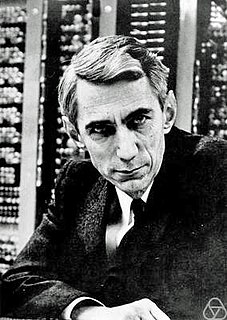A Quote by Claude Shannon
I visualize a time when we will be to robots what dogs are to humans, and I'm rooting for the machines.
Related Quotes
By the time of the Singularity, there won't be a distinction between humans and technology. This is not because humans will have become what we think of as machines today, but rather machines will have progressed to be like humans and beyond. Technology will be the metaphorical opposable thumb that enables our next step in evolution.
Surely, if we take on thinking partners - or, at the least, thinking servants - in the form of machines, we will be more comfortable with them, and will relate to them more easily, if they are shaped like humans. It will be easier to be friends with human-shaped robots than with specialized machines of unrecognizable shape. And I sometimes think that, in the desperate straits of humanity today, we would be grateful to have nonhuman friends, even if they are only the friends we build ourselves.
The exploration of space: Be it by humans or robots, based on the best choice for the mission and the most efficient means to return the data and science sought. Most of the time, this will mean we send robots due to cost and danger. But sometimes, we will need the irreplaceable judgment and descriptive abilities of a person on the spot.
Until computers and robots make quantum advances, they basically remain adding machines: capable only of doing things in which all the variables are controlled and predictable. Robots are bad at pattern recognition and certainly at common sense. That's why computers can beat humans in chess but can't have even a basic conversation with a six-year-old.
Although humans today remain more capable than machines for many tasks, by 2030 machine capabilities will have increased to the point that humans will have become the weakest component in a wide array of systems and processes. Humans and machines will need to become far more closely coupled, through improved human-machine interfaces and by direct augmentation of human performance
I think sometime we will go to Mars and I think we'll explore it with humans sometime, but I think it's really wise to do all the robotic exploration ahead of time and learn as much as possible. Once we have learned as much as possible with the robots, then that's the time to send people, and let them then continue the research that the robots have started.
All experiments that are related to the games when you have humans versus machines in the games - whether it's chess or "Go" or any other game - machines will prevail not because they can solve the game. Chess is mathematically unsolvable. But at the end of the day, the machine doesn't have to solve the game. The machine has to win the game. And to win the game, it just has to make fewer mistakes than humans. Which is not that difficult since humans are humans and vulnerable, and we don't have the same steady hand as the computer.





































